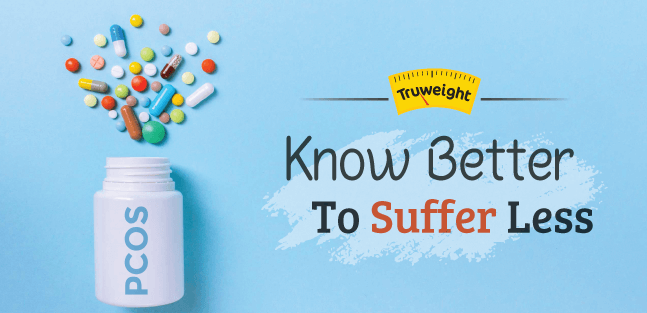Medically Reviewed by Sindhu Vas – Post Graduate in Nutrition and Food science
PCOS, a hormonal disorder, has affected numerous women in the last few decades. As per studies conducted, 1 in 10 women are diagnosed with PCOS and the numbers are rising rapidly.
Some of the primary contributing factors are environmental changes and bad lifestyle choices.
The classic symptoms of PCOS are irregular periods, excess of androgenic hormones and scanty bleeding.
Table of Contents
- The causes of PCOS
- Symptoms of PCOS
- PCOS diagnosis
- Treatment of PCOS
- Management of PCOS
- Solution for PCOS
The causes of PCOS
Almost 6.5-8% of the women population is suffering from PCOS and there could be many reasons associated with the breakout of this condition.
The aetiology of this disorder is not clear, however, there are many factors like stress, obesity, family history and a sedentary lifestyle that could be the reason for developing PCOS.
Common PCOS causes are:
- Excess amount of weight gain
- Lifestyle habits such as sedentary lifestyle and unhealthy eating habits
- Insulin resistance
- Inflammation
Persons suffering from this ailment are not responsive to insulin secreted in the body. The pancreas is not able to function in the normal fashion and becomes resistant to insulin production.
Your body cannot utilise insulin effectively, resulting in more production of insulin. As a result, there is an overproduction of insulin than the normal level which could lead to Type 2 Diabetes.
When PCOS is not treated, it can also lead to:
- Cardiovascular diseases
- High blood pressure
- Cholesterol abnormalities
- Endometrial cancer
It is observed that genetics play a role in PCOS. Women whose families have a history of PCOS are 50 % more susceptible to the disorder comparatively than other individuals.
A woman’s hormones go through a number of changes during the transition from adolescence to womanhood. Some of these hormonal changes are responsible for the onset of this disease.
Sudden hormonal imbalance in the body also leads to excessive weight gain. These hormonal alterations result in a burst of male androgens.
It is observed that most of the women who have PCOS are either overweight or obese and hence, excess body weight has been linked to PCOS.
Symptoms of PCOS
Polycystic Ovarian Dysfunction or Polycystic Ovarian Syndrome (PCOD/PCOS), is characterized by various clinical changes observed in women affected by it.
The common symptoms of PCOS are:
- Inconsistency in menstrual cycles
- Excessive body hair (hirsutism),
- Hair loss or bald patch
- Dryness of skin and
- Eruption of acne or pimples

These clinical features or changes are an indication of the underlying disease that is often called a syndrome when PCOS is accompanied by several other symptoms and signs.
The onset of this syndrome is triggered by bodily changes or changes in physical appearance that could be genetic or phenotypic and sometimes, it could be an idiopathic disorder meaning there is no definite cause for the occurrence of PCOS.
PCOS results in the enlargement of your ovaries. In PCOS women, the ovaries get surrounded by small fluid-filled sacs called cysts. These cysts keep on multiplying as the eggs are not able to get released at proper intervals owing to irregular periods.
In females, there is a regular ovulation cycle that takes place every month. The female reproductive system comprises of a set of ovaries surrounded by a pair of Fallopian tubes, a uterus, and a vagina.
Your ovaries are the source to provide a lifelong supply of eggs. These eggs are young and not fully formed inside the tiny fluid-filled sacs called follicles.
Your pituitary gland, situated inside the brain regulates the functioning of the ovaries through female hormones such as Follicle Stimulating Hormone (FSH) and Luteinizing Hormone (LH).
Since the FSH and LH are secreted in the circulating blood, the eggs start growing and developing leading to an expansion of the follicles.
The Luteinizing Hormone and the Follicular Stimulating Hormone are responsible for the maturation of the eggs inside the follicles.
After the eggs get matured, the follicles release estrogen which is the main reproductive hormone. The estrogen hormone now sends a message to the pituitary gland to secrete LH.
Now your pituitary gland would release significant amounts of LH in the bloodstream. When your LH reaches a certain level, the most mature follicles are directed by the LH to release the mature egg.
This released egg descends the fallopian tube and is now ready to be fertilized. The remaining eggs in the immature follicles get dissolved.
In case, the egg is not fertilized, it is shed in the next menstrual month accompanied by the shedding of the endometrial lining (lining of the uterus).
In PCOS, your body releases unusually high amounts of LH which do not allow the follicles to mature and consequently, the egg is not released. A few of these immature follicles do not dissolve and end up developing into cysts. Instead, these follicular cysts keep proliferating inside the ovaries.
When there is a surplus of LH hormone and the androgenic hormone, the entire cycle gets disrupted and follicular cysts do not dissolve in the blood. As a result, the eggs do not mature and are not discharged from the ovaries. PCOS causes infertility as the ovulation cycle does not occur.
Excess secretion of insulin and LH hormone leads to the production of testosterone. There is a surge in the levels of your testosterone brought about by the interruption of the regular ovulation cycle.
PCOS diagnosis
There are various measures for the diagnosis of PCOS. If you are suspecting of PCOS and have a strong sense of having developed it, you can get it diagnosed through simple steps.
You need to visit a diagnostic clinic and tell the doctor about what you suspect. The doctor would explain to you how is PCOS diagnosed with the inferences obtained from the results.
1. Pelvic Examination
A pelvic exam performed by your doctor can detect PCOS. Your doctor will look for any sort of outgrowths or cysts encircling the ovaries. This exam is performed by wearing hand gloves and manually checking the site.
2. Blood Test
Conducting blood test is a confirmatory method to check for PCOS. Blood tests are run to examine the blood sugars in your body. It also checks the levels of testosterone hormone which could be interfering with the ovulation cycle.
Blood testing can also help in determining your cholesterol and triglyceride levels. If these levels are high, you can develop cardiovascular diseases.
3. Ultrasound
An ultrasound scan is an imaging technique that is useful for the detection of PCOS. Your doctor examines the shape and appearance of your ovaries and looks for any abnormalities outlining your uterus.
The whole analysis is done by the insertion of a device that penetrates through the skin of your vaginal opening. This device emanates sound waves which are then modified to produce the images on a computer screen. The transcribed image is deduced for the evaluation of outgrowths or cysts.
Treatment of PCOS
Although there is no sure shot PCOS treatment available, there are a number of ways to manage this medical condition when clinically diagnosed.
Some clinical intervention is helpful to fight the disease. Of course, there should be some immediate alteration made in the daily routine of an individual that could help in combating this disorder.
PCOS treatment varies from person to person. For instance, if someone wants to get rid of excess body hair, then she would aim at treating the surplus body hair amongst all the other symptoms.
- Change in lifestyle
- Doing more physical activity
- Intake of a nutritious and balanced diet
- Taking the prescribed medication

Counselling should be provided to help deal with weight management and its implementation in a normal lifestyle.
It should be noted that there is no cure for PCOS. Your doctor may recommend one or more treatments to alleviate the PCOS Symptoms.
Insulin treatment can prove helpful if you are suffering from PCOS. Administration of insulin with oral medications in your body would help it to utilize insulin more effectively, thus lowering down the insulin levels
1. Hormonal Birth Control Pills
Intake of birth control pills can address the situation to a great extent by regulating your ovulation cycle.
These medications will be aimed to decrease your testosterone levels which will increase your chance of getting pregnant. It can also reduce the excess body hair growth and the problem of acne and pimples.
Hormonal birth control pills combine estrogen and progestin which regulates the levels of estrogen in the body. This combination can be used in the form of pills, a skin patch or a suppository can help restore your regular menstrual cycle.
It is important to bear in mind that hormonal pills come with side effects and it is always better to check with your gynaecologist about the side effects of the pills you are taking.
Similarly, young women who have never conceived, should not really be opting for this treatment as it can affect their reproductive system during a future pregnancy.

2. Anti- Androgen Medication
Anti-androgen medication helps in reducing male hormones. Thus, it assists in the disappearance of your acne and lowering your hair growth on the face and body. Spironolactone is the most widely used anti-androgen drug.
3. Diabetic Medication
Diabetic medicines like Metformin and Glucophage reduces insulin levels and regulates the ovulation cycle.
4. Fertility Drugs
These drugs can aid in the trigger of your ovulation cycle to occur regularly so that you can become pregnant.
Management of PCOS
If you are suffering from PCOS and want to better manage it, you need to follow a very strict diet regimen coupled with physical exercise to keep the disease at bay.
A blend of proper nutritious and healthy meals and regular exercise can help in tackling PCOS successfully.
Physical activities can help in shedding off those extra kilos. If you are trying to have a baby, weight loss management can actually facilitate you to conceive without any complication.
Laparoscopic Ovarian Drilling Procedure:
This is an invasive treatment for treating symptoms of PCOS. If you have tried all the above-mentioned medication for treating PCOS symptoms but have still not succeeded in eliminating it, this could be your last resort as this procedure definitely helps.
The doctor uses a tiny laparoscope to make small incisions on the section of your ovary where testosterone is produced. With the help of small current, these sections are then scraped off and the damaged tissue is taken care of.
Over a period of time, the amount of testosterone secretion gradually reduces and the normal ovulation cycle might take place.
Solution for PCOS
PCOS is a multitude of symptoms that can make life difficult for women. It deprives a woman not only of the regular lifestyle but could also incapacitate her potency if she wishes to conceive.
Such are the deleterious effects of this PCOS that are not only alarming but also damaging in the long run.
It is important to discuss with your health provider if you have tested positive for any of the diagnostic tests. You should work out a plan with your doctor that aims to achieve the desired results.
1. Cutting down on Your Calories
You should always watch out the proportion of the calories you are consuming if you have PCOS. Eating the right amount and adequate proportion of food is very crucial to successfully fight off your PCOS symptoms. Lowering your insulin levels will help in regulating your menstrual cycle
Changes in lifestyle could also be beneficial in relieving your symptoms of PCOS.
A rigorous approach is required for the treatment of PCOS. A shift in 5%−10% of body weight can improve body weight and regulate the menstrual cycle at proper intermittent intervals.
2. Eating the Right Quantity
It is true that what you eat reflects on your body’s mechanism and functioning. The solution is eating the right quantity and in moderation for someone with PCOS problem. If you are putting up with PCOS, you need to monitor your food regime closely and follow a healthy diet plan.
A nutritious and healthy meal should comprise of lean proteins, high fibers, and a moderate amount of carbohydrates. You should not stuff yourself with foods containing high starch as it will only contribute to your weight gain.
3. Exercise regularly
Exercise combined with the right dietary plan will facilitate in getting rid of the extra kilos. This will alleviate the symptoms of PCOS.
Integrating physical activity into your daily activities will not only increase your fitness and physical strength but also assist in burning the calories.
High-intensity exercises like jogging, burpees and cardio exercises should be incorporated into your physical training. While you are embracing a healthy way towards living life, make sure you are enjoying whatever you do be it exercising or eating because a stress-free life will ensure the correct functioning of your hormones.
4. Carry out core strengthening exercises
Core strengthening exercises aid in toning down your muscles and at the same time boosts up your physical strength and vigour.
Try to do core strengthening exercises like Pilates and squats. Augmenting your muscle tissue with a power-packed exercise will help in the fortification of the body’s core mechanism.
5. Team up with a partner
Studies have demonstrated the success rate of weight loss routines when accompanied by a friend. It encourages you to remain compliant with the exercise routine and stay motivated.
6. Keep a record of your daily progress
Be realistic about the goals you can achieve. Follow a pragmatic approach when you are trying to manage PCOS. Also, a daily note of your physical activity and the diet followed will help in tracking down your progress made so far.

7. Dealing with PCOS through your healthcare provider
When you discover that you have developed PCOS, it becomes difficult to come to terms with the fact that it does not have a proper treatment available.
Management of PCOS can be done by talking to your health provider and getting all the necessary information about it. It can be controlled by following the adequate steps and complying with the medication as prescribed by the doctor.
You can also take suggestions from a nutritionist or dietician who can give you tips on the diet to be followed that can help regulate insulin levels.
Seeking advice from a dietician can provide you with a detailed list of the foods to be consumed in order to control the disorder.
8. Read about the condition
Acquiring all the necessary information about the disorder and its underlying causes can help you understand the care and caution to be taken to manage the condition. You can accomplish it by reading all the material available online.
9. Assemble a cooperation group
Formation of a group is immensely helpful in taking off the sheer amount of pressure from you to deal with the PCOS problem. Talking it out with our family, relatives, and friends can offer you the support and cooperation you could be looking for.
You can also share the experiences with your acquaintances and seek advice from the people who are already dealing with this condition.
PCOS can be effortlessly managed if you lead a healthy and stress-free life.
How can Possible help?
Possible’s approach to PCOS is a holistic approach that is based on nutrition and lifestyle modification.
Possible offers you a personal dietician along with a range of Super Foods which are dense in nutrients and help you in improving your health parameters.
Some of our key principles for PCOS management are:
- Low Glycaemic Index Diet
- Add more Protein and Fibre
- Focus on Good Fats
- Focus on Vitamins
- Go Gluten Free
Some of Possible’s foods that help in PCOS management are:
- Snacks rich in protein & fiber
- Healthy carbohydrates like foxtail millet, kuro millet, amaranth, quinoa & so on
- Hibiscus tea which is rich in antioxidants
- Gluten-Free atta
Takeaways
- PCOS is the most common type of endocrine disorder occurring in women.
- It has a wide range of signs or symptoms appearing in the affected individuals such as inconsistent periods, heavy bleeding, loss of hair, hair growth on the face or other parts of the body.
- It is characterized by insulin resistance, obesity or excessive weight gain, dyslipidemia and obstructive sleep apnea.
Though PCOS may sound complicated, with proper exercise and especially food intake, it can be effortlessly managed. Food plays a key role here and eating nutritious food is very important.
Call our nutritionists today for a free consultation!

Very useful blog that you have shared it is very interesting to read and your way of explanation is understand easily. Thanks.
Hi! We thank you for sharing your feedback towards our article. Keep following our blog to know more health information.